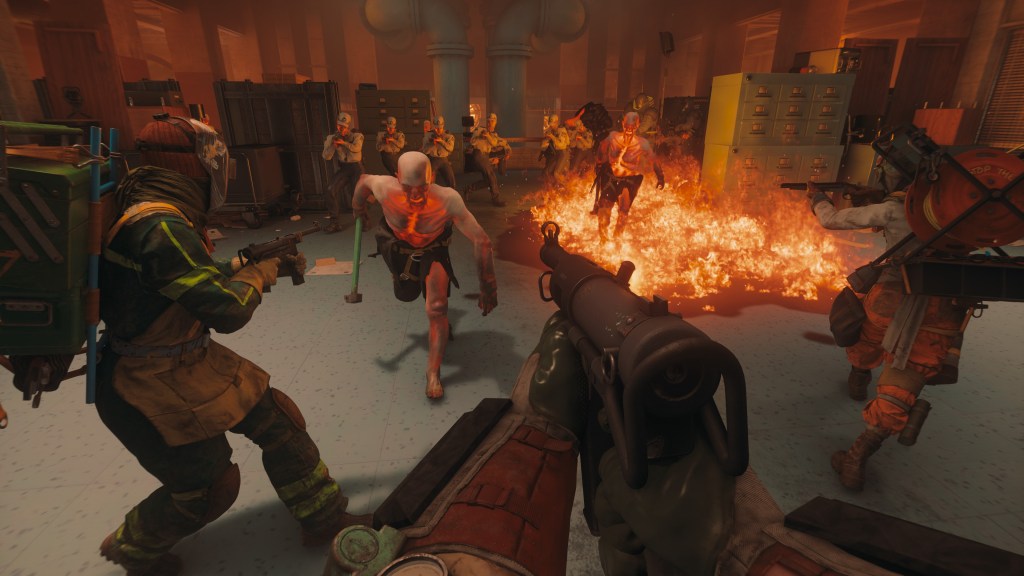
Remedy Entertainment is one of the most beloved developers in modern gaming. The studio has created some of the most unique experiences in the medium to date, bringing the distinctive worlds of Control and Alan Wake to life. Whether you’re a fan or not, the quirky, yet haunting storytelling is something wholly unique to Remedy, and deviates in many facets compared to other games out there. This is why there has been somewhat of a fervor for FBC: Firebreak, the latest from the lauded studio.
The new game from Remedy is a significant departure from its usual fare. FBC: Firebreak is a cooperative first-person shooter set in The Oldest House, the setting of 2019’s Control. Players take on the role as Firebreakers, the Federal Bureau of Control’s first-response unit that takes on the ongoing Hiss threat by using conventional and very unconventional weaponry. In a time where multiplayer, live-service adjacent games are failing at a fairly rapid pace, it’s interesting that Remedy would want to delve into a genre where only a handful of games have survived. While it provides the experience the studio strived for, it doesn’t quite hit the highs of its other titles, and I’m not really convinced it can find the audience it needs to last in such a competitive market.

Arguably, the most important aspect of any multiplayer experience is gameplay. Especially with a cooperative shooter like FBC: Firebreak, which is more in line with games like Left 4 Dead or Warhammer 40,000: Darktide, the gameplay has to be fun, engaging, and present a challenge. If players are patient and learn the ins and outs of FBC: Firebreak, I think all those traits are there. However, it’s mechanically dense and can be daunting when jumping in for the first time.
In FBC: Firebreak, each player chooses a Kit, which provides a unique weapon along with their primary firearm. At launch, there are three Kits: Jump, Fix, and Splash. Each Kit comes with a Tool, an Improvised Device, and an Altered Augment (a.k.a. the player’s ultimate ability), which essentially acts as a role for the player. The Jump Kit utilizes electricity to power generators and shock enemies for some chain lightning attacks. The Fix Kit features a huge wrench used to repair machinery and stagger enemies. Lastly, the Splash Kit extinguishes fires and primes enemies to take more damage.
Although it isn’t required in FBC: Firebreak, it feels imperative that each Firebreaker in a squad of three should have one of each Kit. Each has a use that can allow players to get through a Job, the game’s name for its missions, quickly and easily. It promotes working together to get the job done, which is essential in a cooperative shooter like this.

What makes FBC: Firebreak somewhat complicated, especially during the first few Jobs, is the various systems surrounding what is pretty straightforward moment-to-moment gameplay. A big part in completing Jobs effectively is understanding the various status effects and how to deal with them on the fly. There will be tons of times where players will stand in fire without realizing it, take damage over time, and go down. All of these status effects can be washed away with water, but staying aware is key to success.
Also, learning to use the elements around you to your advantage is integral. For example, a Splash Kit can spray enemies with water, then the Jump Kit can stop all these enemies in their tracks with a single shot, causing a chain lightning effect. There are also environmental tools that can apply these effects, like shooting at a fire sprinkler to shower yourself when low on health, or shooting at oil on the ground to start a fire at the Hiss’ feet. It’s really satisfying when these effects work to the player’s advantage, but with how crazy things can get with the enemies that spawn, it can get hard to keep track of player buffs and enemy debuffs and then use that information favorably.
RELATED: As FBC: Firebreak Launches, Remedy Entertainment Is Prepared for the Long Haul
Along with the status effects, other gameplay systems and features, like opening Shelters to unlock a checkpoint, using specific Kit tools to fix Showers and Ammo Stations quickly, perks, and using ziplines to transport items, are what make FBC: Firebreak different from the rest of the games in this crowded cooperative multiplayer genre. Putting all of this together feels very Remedy, quirks and all.
However, the quality that makes it stand out is also to its detriment. The first few Jobs will be rough, and without more in-depth onboarding, I could see players getting frustrated and putting the game down altogether. When everyone is on the same page, I see the vision Remedy had for this game. But in practice with randoms, especially during launch when everyone is learning, it’s pretty disastrous.
This frustration is a mixture of the game’s lack of communication tools in-game and its aforementioned mechanically dense nature. As far as I can tell, there is no in-game voice chat, which is kind of insane for a game like this. Working together is key to any cooperative game, so the lack of in-game voice chat in FBC: Firebreak is puzzling and makes playing the game with randoms incredibly frustrating, as everyone isn’t communicating. There is a ping function, but those notifications can get lost when dealing with the chaos that ensues.
In terms of content, players looking for a lengthy experience will also be disappointed. There are five Jobs available at launch, each with three clearance levels (which indicate how many zones players will delve into), four difficulty options known as threats, and three corruption options, which indicate different modifications to a Job, like increased enemy speed. Although it’s great that players can customize each Job to their liking pretty extensively, seeing what each Job has to offer doesn’t take long. At normal threat level, with level three clearance, and with a crew of three, I could see players going through all five in a few hours.
It does seem pretty clear that Remedy designed FBC: Firebreak to be played in smaller sessions. However, once players hit the level cap for both the Kits and character, there doesn’t seem to be much to pull players back in. Maybe implementing some sort of leaderboard system could bring players back to try and finish Jobs and beat their own personal score. There just isn’t anything drawing people back in after completing everything the game has to offer.
FBC: Firebreak is a perfectly serviceable cooperative first-person shooter, and Remedy hits the mark it aimed for. For players looking to periodically hop in a session for a couple of Jobs will find some fun if they have a group to play with. However, the lack of an in-game voice chat makes this hard to recommend for people who exclusively play with randoms. If you’re into Remedy’s games, have a group of gamer friends, and have PS Plus Extra or Xbox Game Pass, FBC: Firebreak could be a good departure from the normal cooperative experiences out there for a weekend. But anyone looking for a game that can provide more than that should probably look elsewhere.
Rating: 3.5 out of 5
FBC: Firebreak is available now on PS5, Xbox Series X/S, and PC. A PC code was provided by the publisher for the purpose of this review.
The post FBC: Firebreak Review: Triumphant and Tragic appeared first on ComicBook.com.
